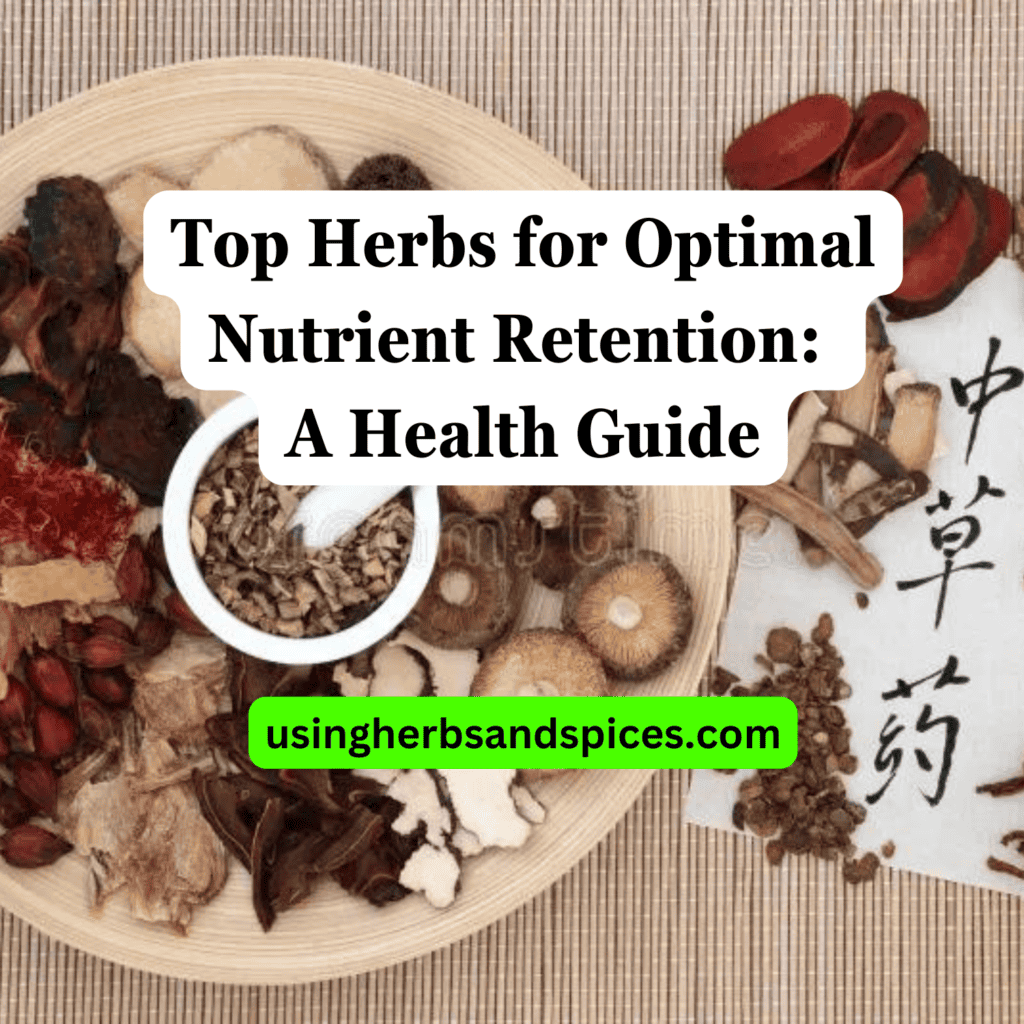SUMMARY: Mint, parsley, coriander, and ginger are key herbs that help your body keep more nutrients from what you eat. Each one has special properties, like making digestion better or fighting inflammation, that make absorbing vitamins and minerals easier.
Struggling to optimize your nutrient uptake through diet alone?

Introducing specific herbs into your meals could be the missing link.
- Mint: The Digestive Aid
- Parsley: Rich in Vitamins
- Coriander: Blood Sugar Regulator
- Ginger: Anti-inflammatory Powers
Continue reading to discover how these herbs can revolutionize your approach to nutrition and help you make an informed decision about your diet.
Mint: The Digestive Aid
Mint isn’t just for freshening breath—it’s a powerhouse herb that plays a crucial role in digestion and, consequently, the optimization of nutrient absorption. Its leaves are packed with essential oils like menthol, which not only impart a distinct aroma and refreshing flavor but also stimulate the salivary glands and digestive enzymes. These enzymes are vital for breaking down food efficiently, thereby enhancing the body’s ability to absorb nutrients.
This herb’s benefits extend beyond the digestive process. Mint has antispasmodic properties, which can help alleviate symptoms of indigestion and bloating. By soothing the stomach lining and intestines, mint facilitates smoother digestion and prevents discomfort, ensuring that the gut can focus on its critical role of nutrient uptake. Integrating mint into your diet isn’t just beneficial; it’s a delightful way to aid your body’s natural digestive processes and boost your overall nutrient retention.
Parsley: Rich in Vitamins
Parsley stands out as a nutrient powerhouse, offering a rich blend of vitamins essential for optimal health. This common kitchen herb, often underestimated as just a garnish, is loaded with Vitamin C, Vitamin K, and Vitamin A, among other vital nutrients. Its high Vitamin C content not only boosts the immune system but also plays a crucial role in the absorption of iron, a critical mineral for transporting oxygen throughout the body. Furthermore, parsley’s Vitamin K content is paramount for bone health, aiding in bone formation and mineralization. Integrating parsley into your diet, whether fresh or dried, can significantly contribute to nutrient retention, supporting both your immune system and bone strength. By enhancing the body’s ability to absorb and utilize the nutrients from your diet, parsley ensures that you get the maximum benefit from every meal.
Coriander: Blood Sugar Regulator
Coriander, often considered a foundational herb in many global cuisines, plays a crucial role in the body’s ability to manage and regulate blood sugar levels. This regulation is vital for ensuring that nutrients are effectively absorbed and utilized by our bodies. Coriander seeds are rich in an array of beneficial phytonutrients and compounds that have been shown to have a positive effect on insulin activity, thereby enhancing the body’s natural process of nutrient absorption. By maintaining stable blood sugar levels, coriander helps in preventing spikes and crashes that can impact nutrient retention adversely. Incorporating coriander into your diet, whether through its fresh leaves or ground seeds, can support metabolic processes, leading to improved health outcomes and optimal nutrient retention.
Ginger: Anti-inflammatory Powers
Ginger is celebrated not only for its distinctive flavor but also for its broad medicinal properties, especially its anti-inflammatory effects. Inflammation in the body can significantly hinder the absorption and utilization of nutrients from our food. Ginger contains powerful bioactive compounds, such as gingerol, which has been studied for its anti-inflammatory and antioxidant properties. These compounds assist in soothing inflammation within the digestive tract, thereby enhancing the body’s capacity to retain and utilize nutrients more efficiently. By integrating ginger into your daily diet, either as a fresh root in meals, a powdered spice, or even as a tea, you can harness its potential to support your digestive health and ensure optimal nutrient retention.
Top Herbs for Optimal Nutrient Retention
Integrating the right herbs into your diet can significantly enhance nutrient retention, contributing to a healthier lifestyle. Here are the key takeaways:
> Mint aids in digestion and nutrient absorption, making it a valuable addition to meals.
> Parsley is rich in vitamins that support nutrient absorption and overall health.
> Coriander assists in regulating blood sugar levels, which is crucial for optimal nutrient processing.
> Ginger’s anti-inflammatory properties help in maintaining and improving nutrient retention.
Adopting a diet that includes these top herbs for optimal nutrient retention promises a pathway to enhanced wellbeing and health. Begin incorporating them into your daily meals to reap their full benefits.
Top Herbs for Optimal Nutrient Retention FAQs
How do herbs enhance nutrient retention?
Herbs enhance nutrient retention by aiding in digestion, supporting the absorption of vitamins and minerals, regulating blood sugar levels, and reducing inflammation. This not only helps in maximizing the benefits received from the food we consume but also supports overall health by making sure our bodies efficiently utilize the nutrients ingested.
Can these herbs be taken together for enhanced effect?
Yes, these herbs can be combined and taken together in various dishes or teas to enhance their nutrient retention capabilities. Combining herbs like mint, parsley, coriander, and ginger can create powerful synergies that amplify their individual benefits. However, it’s always advisable to start with small amounts to see how your body responds.
Are there any side effects of incorporating these herbs into my diet?
While these herbs are generally safe for most people, incorporating them into your diet in moderation is key to avoiding any potential side effects. Individuals with allergies or specific health conditions should consult a healthcare provider before making significant changes to their diet, especially when introducing new herbs. In some cases, high doses might interact with medications or medical conditions, so starting with smaller doses is recommended.
